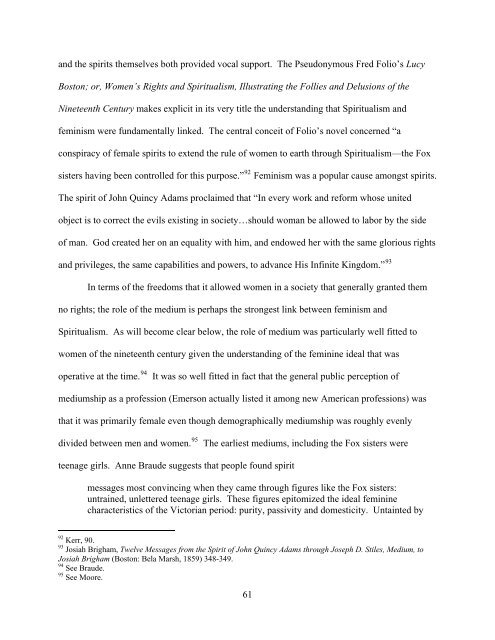A Genealogy of the Extraterrestrial in American Culture
A Genealogy of the Extraterrestrial in American Culture
A Genealogy of the Extraterrestrial in American Culture
Create successful ePaper yourself
Turn your PDF publications into a flip-book with our unique Google optimized e-Paper software.
and <strong>the</strong> spirits <strong>the</strong>mselves both provided vocal support. The Pseudonymous Fred Folio’s Lucy<br />
Boston; or, Women’s Rights and Spiritualism, Illustrat<strong>in</strong>g <strong>the</strong> Follies and Delusions <strong>of</strong> <strong>the</strong><br />
N<strong>in</strong>eteenth Century makes explicit <strong>in</strong> its very title <strong>the</strong> understand<strong>in</strong>g that Spiritualism and<br />
fem<strong>in</strong>ism were fundamentally l<strong>in</strong>ked. The central conceit <strong>of</strong> Folio’s novel concerned “a<br />
conspiracy <strong>of</strong> female spirits to extend <strong>the</strong> rule <strong>of</strong> women to earth through Spiritualism—<strong>the</strong> Fox<br />
sisters hav<strong>in</strong>g been controlled for this purpose.” 92 Fem<strong>in</strong>ism was a popular cause amongst spirits.<br />
The spirit <strong>of</strong> John Qu<strong>in</strong>cy Adams proclaimed that “In every work and reform whose united<br />
object is to correct <strong>the</strong> evils exist<strong>in</strong>g <strong>in</strong> society…should woman be allowed to labor by <strong>the</strong> side<br />
<strong>of</strong> man. God created her on an equality with him, and endowed her with <strong>the</strong> same glorious rights<br />
and privileges, <strong>the</strong> same capabilities and powers, to advance His Inf<strong>in</strong>ite K<strong>in</strong>gdom.” 93<br />
In terms <strong>of</strong> <strong>the</strong> freedoms that it allowed women <strong>in</strong> a society that generally granted <strong>the</strong>m<br />
no rights; <strong>the</strong> role <strong>of</strong> <strong>the</strong> medium is perhaps <strong>the</strong> strongest l<strong>in</strong>k between fem<strong>in</strong>ism and<br />
Spiritualism. As will become clear below, <strong>the</strong> role <strong>of</strong> medium was particularly well fitted to<br />
women <strong>of</strong> <strong>the</strong> n<strong>in</strong>eteenth century given <strong>the</strong> understand<strong>in</strong>g <strong>of</strong> <strong>the</strong> fem<strong>in</strong><strong>in</strong>e ideal that was<br />
operative at <strong>the</strong> time. 94<br />
It was so well fitted <strong>in</strong> fact that <strong>the</strong> general public perception <strong>of</strong><br />
mediumship as a pr<strong>of</strong>ession (Emerson actually listed it among new <strong>American</strong> pr<strong>of</strong>essions) was<br />
that it was primarily female even though demographically mediumship was roughly evenly<br />
divided between men and women. 95<br />
The earliest mediums, <strong>in</strong>clud<strong>in</strong>g <strong>the</strong> Fox sisters were<br />
teenage girls. Anne Braude suggests that people found spirit<br />
messages most conv<strong>in</strong>c<strong>in</strong>g when <strong>the</strong>y came through figures like <strong>the</strong> Fox sisters:<br />
untra<strong>in</strong>ed, unlettered teenage girls. These figures epitomized <strong>the</strong> ideal fem<strong>in</strong><strong>in</strong>e<br />
characteristics <strong>of</strong> <strong>the</strong> Victorian period: purity, passivity and domesticity. Unta<strong>in</strong>ted by<br />
92 Kerr, 90.<br />
93 Josiah Brigham, Twelve Messages from <strong>the</strong> Spirit <strong>of</strong> John Qu<strong>in</strong>cy Adams through Joseph D. Stiles, Medium, to<br />
Josiah Brigham (Boston: Bela Marsh, 1859) 348-349.<br />
94 See Braude.<br />
95 See Moore.<br />
61















